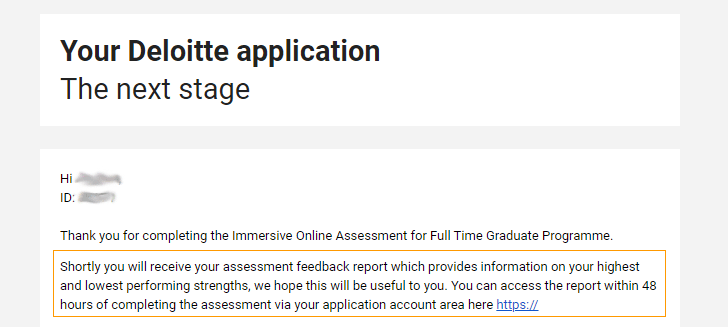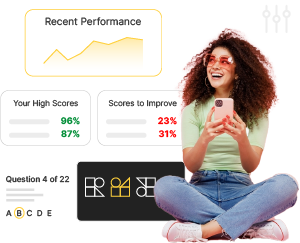How to Use Feedback to Maximise Future Performance
The importance of asking for feedback after interviews and assessments, and how to use that feedback most effectively.
Page contents:
Jump to:We receive feedback all the time in our lives so it’s important to know what to do with it – especially when it comes to job performance and skills.
Our increasingly competitive job market has led to a growing number of applicants per vacancy. This means that even the strongest candidates are likely to face disappointment throughout the selection process.
It is becoming ever more important for candidates to receive feedback on their performance so they know how they can improve for future assessments.
Feedback From Interview Rejections
It can be tough and disheartening being unsuccessful in your interview but it’s important to try and make a positive out of it. View this as an opportunity to learn from your performance and develop your interview skills.
It is becoming ever more important for candidates to receive feedback on their performance so they know how they can improve for future assessments.
Meaningful feedback
How meaningful your feedback is may depend on what stage of the application process you reached. It could be the case that they no longer view you as a viable candidate after an initial phone interview or a video interview. In this instance, the feedback you receive may lack meaningful insights due to the limited time they have spent with you. This basic or generic feedback will tend to be less valuable.
The feedback that will be most valuable is once you have spent some time with the employing company and they have started to identify your strengths and personality. Once you have passed initial screenings and online tests, you can usually assume that your skillset is viable for this role. So, it may be the case that there was something specific that caused them to go in another direction. It’s important to receive this feedback as this will enable you to work on the perceived weakness.
Asking for feedback after an interview
If your application was handled by a recruiter, it is best practice to ask that recruiter if the employer has any feedback.
If you handled your application yourself and there was no recruiter, then it is best to email or phone the individual who was your point of contact during your application or who took the interview.
Try using something like the following email template if you're unsure what to send:
Feedback E-mail Template
Hi [Name],
Thank you for your email, whilst I'm disappointed not to be selected, it was a pleasure meeting everyone at [Company Name].
It would be greatly appreciated if you could give me some feedback on my application and interview, and any reasons as to why I was not the right fit for the role.
Any insights would be greatly appreciated.
Many thanks, [Name]
Don’t be surprised if they decline to offer any feedback, there are many reasons they may not wish to give feedback and are not required to. This would be unfortunate, but sadly there is nothing you can do.
Feedback From Online Assessments
Gaining feedback after you have completed psychometric tests can be extremely valuable when you are going through the job selection process. Whether you have been offered the position or not, it is always beneficial to know your strengths and weaknesses, particularly if you are looking to improve your performance on future assessments.
Some recruiters may write to you with your test results or arrange an individual feedback session (face-to-face or over the telephone). However, many organisations are unable to (or choose not to) do this on account of time constraints. This can often be true of large graduate employers who deal with vast numbers of potential candidates and large volumes of test results.
However, as they collect your answers and analyse your test results to inform their decisions, you should at least be able to see your scores. Deloitte are one such company that provide you with your results along with your strengths and weaknesses after you have completed their assessments.

Asking for feedback after an assessment
It is always worth trying to get feedback from the employer by contacting them directly, via email or in writing. You may like to try requesting a written report of your test results.
It can be common for candidates to simply receive an email expressing that unfortunately your application will not be taken any further, without any further information about your test results.
It is also good practice to enquire or search online in advance about an employer’s feedback processes if you know you will be completing psychometric tests, and the employer should provide you with feedback as a matter of courtesy and good practice.
A quick browse of the employers application process and you can sometimes find if they provide feedback, like this excerpt from KPMG's site:

Employers abiding by the British Psychological Society guidelines on psychometric testing (i.e. most employers) have agreed to provide feedback to candidates, so you are perfectly within your right to ask for it.
Feedback From An Assessment Centre
If you made it to the assessment centre, then congratulations! Only a very small percentage of candidates get this far so you should be proud.
Assessment Centre’s are a combination of interviews and assessments where the employer will be able to learn a lot more about you. The feedback you can receive from assessment centres is invaluable; try to use it as a tool for motivation. You will almost certainly be able to receive feedback after an assessment centre as this is usually the final stage of the application process. Employers will be more willing and have personalised feedback on your performance.
Whether you have been offered the position or not, it is always beneficial to know your strengths and weaknesses, particularly if you are looking to improve your performance on future assessmentsAlbert, EY Graduate
PRO TIP
You may find out at the end of the assessment centre whether you were successful, or it could be that they contact you a few days after. Whichever the case, once you find out you should ask them for feedback ASAP so that the impression you left on them is still fresh in their mind. Be sure to ask politely, you don’t want to leave a bad impression especially if you are considering applying to the same company in the future.
How To Use Constructive Criticism
Finding out that you haven’t been selected for a job is always difficult, so try and take a moment out for yourself before delving straight in to examining your performance. Try not to jump to the conclusion that you aren’t good enough for your dream job. Instead, try to take a more balanced view – might it mean that you just need to do more preparation next time?
Always try to be open to their feedback. It’s easy to jump to your own defence and shrug off whatever they have to say, but this won’t be productive or help you improve for the next time.
It can be really helpful to know your individual score for each psychometric test you completed. Percentile scores are particularly useful as they indicate how your performance compared to other people who took the test and can help you to identify which tests were relative strengths and weaknesses for you. For example, you might find that you performed well on the verbal reasoning test but that you were let down by your numerical reasoning score and need to polish up on your basic maths skills for next time.
Whilst there can be no right or wrong answers on personality questionnaires, feedback can indicate if there are particular attributes you need to further develop in order to achieve a greater ‘fit’ with the organisation. For example, you might consider assertiveness or social skills training.
Once you have received all your feedback it is important to practice
Practice the suggested areas. You have been shown perceived areas of weakness, and so this is a fantastic opportunity to work on those weak areas and ensure you are successful next time around. You will be able to find test advice and practice material for all psychometric tests and assessment centre guides on our site.
PRO TIP
If employers want to discuss feedback with you directly, this is common at the end of assessment centers, it is important to remember that this may be another part of their assessment of you. Take this as an opportunity to respectfully share your own views about your performance, to clarify the feedback and to ask for their advice on where they think you could improve and how.
What If I Didn’t Receive Any Feedback?
In the absence of feedback from the employer, you may need to rely on self-evaluation. In doing so, it is important that you think constructively about your performance across each of the psychometric tests you completed. Ask yourself what your strengths and your weakness were and what you might have done differently next time around. For example:
- How was your pacing? Did you spend too much time on the early questions and compromise the latter ones?
- Did you struggle to solve the complex puzzles in the diagrammatic reasoning test?
- Were you familiar with the vocabuluary used in the verbal reasoning tests?
- Was there anything that felt easier or more enjoyable? What tests do you not need as much practice on next time?
Your answers will give you some clues as to what you need to practice in advance of future assessments. But be warned – we are often our own worst critics, so use the self-evaluation approach with caution and be sure to always pick out the strengths in your performance.
I hope we’ve been helpful, and you’ve been able to gather some valuable feedback from your desired employers. Now it’s time to work on those weak areas and bounce back!
Start practising quality tests with a free account
Practice makes perfect
- Learn from detailed solutions
- Track your progress

Additional psychometric test resources
We have lots of specialised and specific psychometric test advice waiting for you. Simply navigate over to our resources section where you can find all of our test advice, or click on one of the following links you may find useful:
